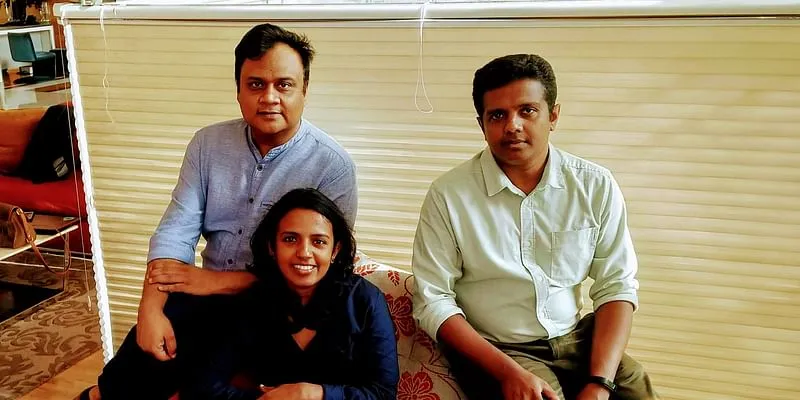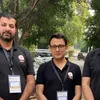This Gurugram-based healthtech startup is helping bridge the immunisation gap
Cloud-based healthtech startup ImmunifyMe leverages technology to monitor and track vaccination schedules, ensure every child is vaccinated on time, and bridge the immunisation gap.
A whopping three million children around the world can be saved from sure death through immunisation, according to a UNICEF study. And yet, one in every five children is not vaccinated.
This reality unsettled friends and colleagues Neeraj Mehta, Dr Nadeera Nilupamali, and Sudheera Lakmal, and drove them to address it with technology, leading to the birth of in 2017.
ImmunifyMe leverages technology to monitor vaccinations and ensure every child is immunised on time. The trio initially started with a Facebook page where they tried to educate people on vaccines.
Neeraj participated actively in the Pulse Polio programme during which he realised that there was no proper monitoring system in place and many children were getting double doses.
“ImmunifyMe was born out of a need to solve a global problem. We didn’t really have a eureka moment, but started going deep into the field of immunisation and realised that it was not an India-specific problem but a global issue. Vaccines are the cheapest form of disease prevention. They lays the foundation for a healthy child and therefore a healthy nation,” Neeraj says.

The founders of ImmunifyMe
How it works
ImmunifyMe is a cloud-based ecosystem complete with a web interface, mobile app, and a smart card. It sends automated reminders to parents and caretakers about upcoming immunisation dates and camps, thus ensuring that the immunisation is not missed.
It also maintains all records of immunisation of a particular child to prevent possibilities like double immunisation, which can adversely affect the child’s health.
“Our system is designed for every country. It can help you track the national vaccination policy of any country. By a simple request, newly-introduced vaccines can be added to the system. A parent can monitor the growth of the child in real time. You can access vaccination records from anywhere in the world, 24/7,” Neeraj says.
If users misplace their vaccination cards, they can request for a new card with the previous records. Even an analog phone user will be able to register and receive notification via SMS or voice calls.
The early challenges
It took one and a half years of planning and two more years to develop the product. The key challenges were: convincing policy makers to adapt to change, understanding country-specific requirements and adjusting accordingly, providing training on how to use the system, and educating people.
“We started working with the private sector and did small pilots to catch the eye of policymakers. We did projects in various developing countries, which gave us enough scope to adjust the system for high tech and low tech requirements. We imparted one-on-one training to healthcare providers and gave them hands-on experience. We have our technology development team in Colombo, Sri Lanka. We have been working on POC (proof of concept) in various developing countries like Tanzania, Republic of Benin, Malawi etc,” Neeraj says.
An MBA from National University of Singapore, Neeraj has been in the healthcare business for close to a decade. Nadeera is a virologist who has knowledge of vaccines and vaccination flow to take care of the product development. Sudheera is a cloud architect with experience in implementing large-scale secure distributed systems and ecommerce platforms and can take care of the technology behind ImmunifyMe.
“We have software engineers working on the product, quality assurance person to perform QA, public health professionals, and marketing and sales professionals to ensure ImmunifyMe reaches every child to reduce the immunisation gap,” Neeraj says.
The business model
While the team did not reveal the cost, it said it charges a subscription fee for ImmunifyMe cards and also provides B2B subscriptions to private hospitals and pharmaceutical companies.
The platform also runs and manages various vaccination and immunisation campaigns, immunisation training programmes for health volunteers/workers/professionals, and marketing campaigns for vaccine manufacturers.
“We are currently monitoring 42,000 children. We are growing at 56 percent month on month, and have earned a gross revenue of $120,000 till date,” Neeraj says.
The team believes that the potential for the early childhood care market is huge, as over 128 million children are born every year worldwide. With their current product, the founders have entered the markets of India and Africa where approximately 60 million children are born annually.
“Our initial target is to reach about seven million children born in private hospitals in these regions,” Neeraj says.
Funding and the market
The team received around $300,000 in grants to develop the product. The world’s largest vaccine manufacturing (doses wise) company, Serum Institute of India, made a seed investment of $1 million in the company.
Today, the healthcare ecosystem is exploding with different startups focussed on preventive care. Currently, startups like , , and Hyderabad-based work on providing preventive solutions based on an individual’s genetic makeup.
Apart from that, startups like Healthians, Practo, 1Mg, Mfine are focused on preventive care. However, few are eyeing the early childcare and immunisation space.
Speaking of future plans, Neeraj says they are looking to “streamline analytics of vaccination monitoring, record keeping, and outreach without adding significant complexity to the workflow".
The other focus is on providing "accurate and verifiable proof, aggregating data that can easily inter-operate with other existing identity management systems, negating the need for each organisation to independently identify beneficiaries, taking timely interventions in outbreak situations, disease surveillance, and making policies to bridge the immunisation gap.”
Edited by Javed Gaihlot









